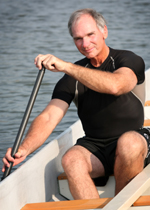Survivors honored through personal
stories
The
Hollings Cancer Center is honoring cancer survivors for their hope,
courage and perseverance in battling cancer through a special poster
display throughout the summer.The display, Faces of Hope, began as a celebration of National Cancer Survivors Month in June, and is a presentation of pictures and personal stories of cancer survivors who share their stories of overcoming unconscionable odds in their struggle against cancer. Faces of Hope stories cover the full spectrum of life experiences, ages, race and gender. Some of the survivors are athletes; some are young aspiring models, husbands, wives and entrepreneurs. And all of them share a similar story that, while tragic, also reflects the absolute courage and resolve of their human spirit to keep going despite the pain and odds.
Beating cancer is getting a bit easier due to advanced therapies. Thirty years ago, only 3 million people with cancer survived, whereas today 10 million people with cancer are survivors. In addition, cancer-related deaths have declined for the past two years. Still, cancer is the second leading cause of death among South Carolinians.
For the coming weeks, The Catalyst will bring these stories to you. Meanwhile, the posters are on display in the Hollings Cancer Center at 86 Jonathan Lucas St.
by Bob Carson
Cancer survivor
How does one tell the story of a personal struggle to combat the diagnosis of cancer? How do you tell your buddies you won’t be there for the first day of hunting season… or maybe any other day? How do you convey the terror of surgery to cut out part of your neck and tongue? How do you let your family take care of you when you expected to take care of them? How do you find the inner strength when physical strength has always been taken for granted? How indeed!
 Bob Carson
Bob CarsonFirst: Listen carefully with eyes wide open….My doctors always had my best interest at heart, but I needed to learn all I could about my disease, my options and my outcomes. Being competitive, I made up my mind to be in the survivor’s category. My family and I took an active role in facing our new dilemma… finding good food and planning treatments so I could continue working; speaking with survivors who had been through similar treatments; always asking questions.
Second: Take it one day at the time. It helped to learn to separate adverse effects of the cancer treatment from the effects of the cancer itself. Knowing that side effects could be managed and would go away in time helped get me through the treatment. Plan something to look forward to after your treatment. By November, 35 pounds leaner and with a new hunting outfit…I went to Canada for a trophy hunt.
Third: Be vigilant. The doctors don’t tell you to come back to see them for their own health. After two years of good follow up reports, I took a once-in-a-lifetime trip to Africa. While sitting quietly in an archery blind waiting for a Kudo or Water Buffalo to come to drink, I could hear in the silence the blood gushing through the artery on the right side of my neck with each heart beat. Thinking that it was only the virtual silence that surrounded me I paid no attention. Upon my return home I looked carefully at my neck just below my right ear and noticed a knot. It felt hard and when I pressed it, I could hear the blood gushing louder. After the swelling increased, I returned to see Dr. Terry Day at MUSC.
Only people who have heard “Your cancer is back” can describe what goes through your mind. X-rays, CT scans, PET scans, MRIs, the waiting rooms … I was paralyzed with fear. The following words flooded my brain, “Is there any hope for me? Will they operate and say we cannot help you?”
This time I lost a major muscle in my neck and a portion of my tongue. More radiation and chemotherapy were recommended, this time twice-a-day radiation with chemo for “lunch”… Who could stand that? When my radiation doctor told me that a woman half my size and twice my age was going through a similar regimen, my competitive spirit emerged again. Thank goodness for tough grandmas as role models.
Today, six years from my first visit to MUSC, is a great day for me as is every day I spend with my wife and three daughters. Yes, I do suffer from lasting side effects from my treatments. But I’m here and winning the war against cancer with my family and friends. Joining other Dragon Boat Charleston Cancer survivors has enriched my life. These athletes take surviving to the next level. Dragon boaters offer no sympathy, but lots of empathy and laughter. These elements, along with power of family and friends, are very therapeutic. A special thanks to them for helping me realize that hope and caring for others is part of leading a fulfilling life.
Friday, July 13, 2007
Catalyst Online is published weekly,
updated
as needed and improved from time to time by the MUSC Office of Public
Relations
for the faculty, employees and students of the Medical University of
South
Carolina. Catalyst Online editor, Kim Draughn, can be reached at
792-4107
or by email, catalyst@musc.edu. Editorial copy can be submitted to
Catalyst
Online and to The Catalyst in print by fax, 792-6723, or by email to
catalyst@musc.edu. To place an ad in The Catalyst hardcopy, call Island
Publications at 849-1778, ext. 201.